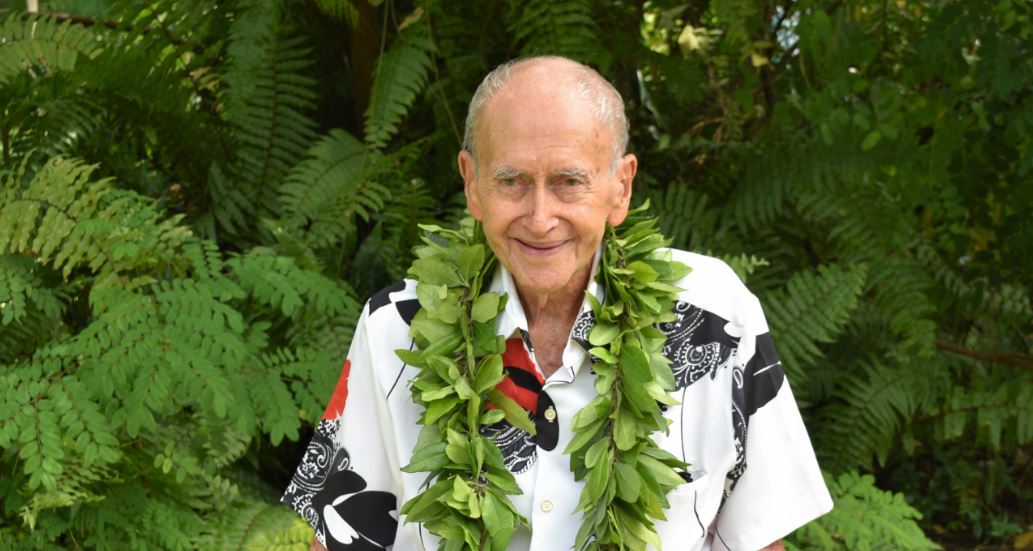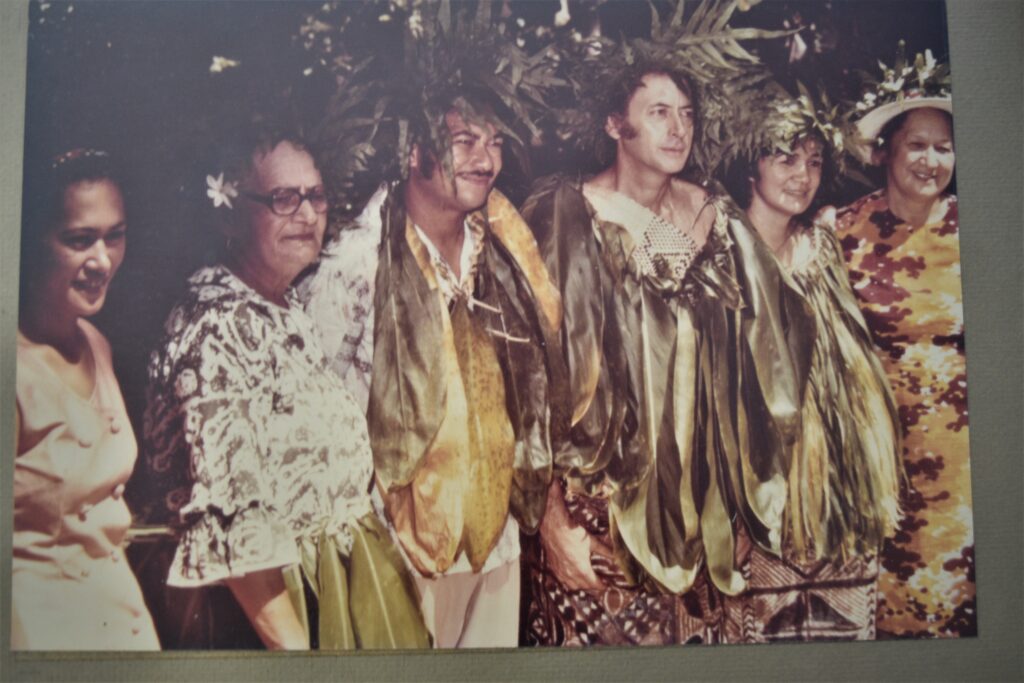Telling it like it is –Framhein’s 90-year journey
Saturday 11 February 2023 | Written by Melina Etches | Published in Features, In Depth, Memory Lane

Ninety-year-old Apai Raropua Mataiapo Tutara - Tekeu Emil Framhein tells it like it is. 23021004
Sharp, witty, wizened and well groomed, 90-year-old Apai Raropua Mataiapo Tutara Tekeu Emil Framhein still tells it like it is, good naturedly with no filter. Affectionately known as Apai or Papa Keu, Framhein shares some of his life’s journey with Cook Islands News senior journalist Melina Etches.
Wearing a content smile, Framhein doesn’t mince his words. “I don’t care what I say at times, at least I have a clear conscience.”
Born on January 30, 1933 on the island of Rarotonga, Framhein celebrated his 90th birthday last month with family and friends at Tamarind House.
“I feel good, I feel the same as yesterday… being a pain in the butt to everybody,” he says, with twinkles in his eyes.
Framhein believes his good diet of vegetables has played a big part in living longer.
“I don’t like fatty food and I always eat a lot of greens, but at this age the greens are not too good to me, because of my medication,” he says.
He still resides in Tupapa, in one of the homes he was raised in.
Framhein was born to parents Wilhelm Framhein who was half German, and his mother Bebe (Pepe) Davis nee Hunter from the Apai family.
He has three siblings – his eldest brother Carl passed away in 1973, one of his sisters Erica has also passed on and his younger sister Teresa lives in Kiikii.
His early childhood education started at Avarua Primary School.
When the “English speaking” school opened on the seaside (where the Beachcomber now stands), he was told to move there.
“I did not enjoy it there, so just went back to my old school at Avarua,” says Framhein.
As a child he also spent some time on the island of Mauke where he stayed with his uncle Edward Framhein in Tepari.
“To go to school, I had to walk about nearly a mile through bush from our home in Tepari, it was a scary walk,” he remembers.
“And in those days, the punishment at school was, you go outside and collect soil to put on the cricket pitch.”
Several months later his mother Pepe sailed on the Tiare Taporo to return him to Rarotonga, but on their way back from Mauke a hurricane struck and the boat had to shelter on the leeside of Atiu.
When daylight broke, the people of Atiu came out in their long boats and took everyone ashore.
“We stayed there for about a week,” says Framhein.
On January 31, 1944 – a day after his 11th birthday – his father died.
“Our dad died when I was young, he was sick so my mother had to raise us three kids.”
And as is usual in Polynesian families, families rallied around to help out.
On September 13, 1944 he was sent to Aotearoa New Zealand on the Maui Pomare to stay with his Aunt Frieda in Thames.
“This was during the war,” he says.
Framhein attended Thames Central Primary School in New Zealand, and in 1946 Belmont Primary School in Takapuna, then onto Takapuna Grammar School where he first met Bruce Graham and his sister, and Don Dorrell.
“Don and I were some of the best swimmers in the school and usually we would beat the other Grammar schools,” says Framhein.
He also played rugby and soccer, took up rifle exercises and boxing training and joined the Boy Scouts.
In Takapuna he lived with his uncle from Mauke, Metua Williams who looked after him for seven years.
Framhein also lived with his Uncle Charlie and Aunty Lola in New Zealand, “she looked after me like her own,” he says.
“When she (Lola) died, she was cremated and I asked her family for her ashes to take back to Rarotonga,” he says. They agreed.
Returning home to Rarotonga in October 1952, he stayed with his grandpa Tekeu Paitai, and Judge McCarthy and Aunt Helene
Then in January 1953, he had to travel back to New Zealand to complete compulsory military training.
“At the barracks there were these long rows of toilets and showers with no doors,” shares Framhein.
“It was a good experience, you wake up early, make your bed and if a bed is not made properly everyone has to remake their beds – on one occasion we had to do it 16 times.”
What was tough he says was the “root march” – marching with a full backpack for 21 miles. He continued training at the Narrow Neck military camp where he was taught how to use guns.
Before returning to the Cook Islands for good, he did a stint at the National Bank in New Zealand to pay for his passage to Rarotonga.
In 1954 he joined Cook Islands Public Works Department (PWD) where he worked for three years. Win Ryan was in charge and Malcolm Macquarie was in charge of the joinery side.
“We had an old military van with no doors at the back and driving on the dusty road, we would end up full of dust,” he says.
His work attire was long socks up to the knee, short white pants, “everything white”, and he was given the nickname “Tiamani” – the Maori version of German.
While working in Aitutaki for six months running the PWD store, Framhein stayed with John and Myra Harrington.
“It was an opportunity to see how he (John) looked after the TEAL Flying Boats – refuelling from Samoa and flying off to Tahiti.”
In 1956 he managed the Union Steamship Shipping company until it was taken over by government.
This was a special year, he met Nathalie Mervin, the love of his life, while visiting Tahiti. He returned to Tahiti in 1957 to ask for her hand in marriage.
Framhein married Nathalie in 1957 and they had four sons William, Henry, Carl and Robert. Nathalie passed away in February 1985.
“I was lucky with my wife, she was a beautiful woman…” he says.
In 1969 he joined the Rotary Club of Rarotonga shortly after it was established and in 1972, he became the president of the Chamber of Commerce.
On April 5, 1975, he was invested as traditional leader Apai Raropua Mataiapo Tutara and admitted to Te Koutu Nui, a council of hereditary chiefs, of which he is still an active member, and since his initiation he has attended nearly every Annual General Meeting.
He was also elected the Pu Tapere (leader of the village) of Tupapa Maraerenga.
Together with the community, the Osana Meeting House which was constructed in 1885 from limestone was renewed, and he also chaired the renovations of the historic Tupapa Nui O Au Meeting House in 2009/10.
Framhein managed the Union CITCO Travel until 1978, and during that period he sailed on the Lindblad Explorer as a guide to the islands of Suwarrow, Manihiki and Penrhyn.
In 1978 he joined Airfreight International Services until 1985 when he left and joined Triad Petroleum. He then joined Cook Islands International Airlines in 1986.
He stayed in the travel business, in August 1988 he joined Air Rarotonga starting as a reservation officer for Polynesian Airlines and travelled to many countries including Hawaii, United States and Europe. He retired from Air Raro in 2000.
He was also a member of the first Cook Islands Tourism Board.
In 1997 he was recommended by the then Minister of Justice Tiki Matapo to become a Justice of the Peace (JP). He was appointed a JP the same year and became a Marriage Celebrant in 2002.
Throughout his lifetime, Framhein has observed the changing climate in the South Pacific and amassed a wealth of tauianga reva (traditional knowledge).
Passionate about the preservation of cultural, values and traditions, he has been responsible for reviewing projects to ensure that proposed activities take place in accordance with the community’s values and priorities.
Framhein has been an advocate for environmental protection for many years and is one of the last remaining original members of Koutu Nui who participated in the ra’ui re-establishment programme.
“The raui system is still very important to keep, to preserve what we have in the ocean, and I disagree with the exploration of the nodules,” says Framhein
“We don’t know what’s down there and the money people don’t give a damm about what’s down there, as long as they can pick it up...”
He also supported the first recycling education campaign run by Te Ipukarea Society during the 1996 Clean Up the World campaign.
Dedicated to culture and the community, in 2007 as vice president of Koutu Nui he attended the Pacific Peoples Partnership conference themed ‘Shifting Tides: Indigenous Responses to Climate Change’ in Canada. There he made presentations on sea frontage conservation by planting trees to help withstand storms and sea surges.
Te Pa Mataiapo Imogen Ingram accompanied Framhein to the programme and delivered a presentation. They also met indigenous people and visited the Arctic Circle.
Framhein was active in various sports on the island and used to participate in lawn bowls, tennis and sailing at Muri lagoon.
One of his well-known hobbies is growing anthuriums, which his wife actually started.
On each returning trip from Tahiti they would bring back varieties of anthuriums.
“We started growing them in 1965 in Maraerenga, then we moved them here.

“Then we started pollinating our own,” shares Framhein, adding the regular use of the manure for the plants caused his leg to become infected.
“It’s the beauty of them (anthuriums), I like to see them in bloom. He even named a pink variety they crossed “Nathalie” after his wife.
“We had all different colours…, aere mai te aronga kikia (then the thieves came along).”
Several women were caught stealing the plants. “We caught them on camera,” he says, “and to this day I’m still waiting for some to be returned…”
Although Framhein is not physically active like he used to be, he would like to get back into his garden once his leg has healed properly.
However, he is still attending community meetings nearly every day.
“If you don’t do anything, you get bored with life, there’s plenty to do,” Framhein says.




















































